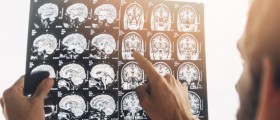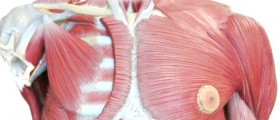
The exact cause of this neurological disorder has not been identified yet. Approximately 5-10 % of all patients inherit the disease. Initially, there is muscle twitching and muscle weakness in upper or lower extremities. Some patients in initial stages suffer from slurred speech. Further progression of amyotrophic lateral sclerosis leads to one's inability to control muscles he/she uses to move, speak, eat and breath.
Diagnosing Amyotrophic Lateral Sclerosis (ALS)
It may be quite difficult to set diagnosis in early stages of amyotrophic lateral sclerosis. This happens because the symptoms and signs of the condition may be similar to symptoms and signs of other neurological diseases. However, final diagnosis can be set after the doctor excludes other potential neurological diseases. In order to achieve this he/ she performs electromyogram, nerve condution study, MRI of the brain and spinal cord and specific blood and urine tests.
Electromyogram (EMG) tests electrical activity of muscles. Nerve condution study is commonly performed together with electromyogram and is an excellent means of evaluating conduction of electrical impulses down peripheral nerves. MRI of the brain and spine may point to certain structural changes. And finally, one more test is a muscle biopsy. It is generally performed when doctors suspect on a muscle disease rather than amyotrophic lateral sclerosis.
Treatment for Amyotrophic Lateral Sclerosis
The goal of treatment is to slow the progression of the disease and help patients feel comfortable. The treatment also helps them feel more independent. Unfortunately, amyotrophic lateral sclerosis is incurable.
The only medication approved by FDA and administered to patients suffering from amyotrophic lateral sclerosis is riluzore. It seems that the drug can slow progression of the disease. Furthermore, symptomatic treatment may include some of the drugs used in case of muscle cramps, constipation, excessive salivation or phlegm and fatigue. Patients may be also prescribed pain relievers and antidepressants.
Physical therapy for such patients is a must. They are generally prescribed low-impact exercises. The program maintains certain level of cardiovascular fitness, range of motion and muscle strength. Occupational therapy for people suffering from amyotrophic lateral sclerosis helps these patients adapt to braces, walkers and wheelchairs. And finally, since the disease also affects muscles in charge with speech, this issue is dealt with the assistance of speech therapy.
















Your thoughts on this
Loading...